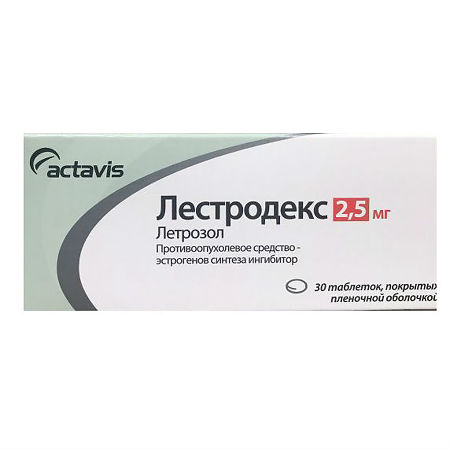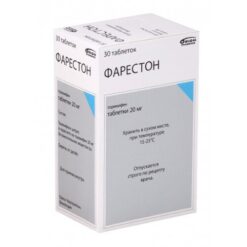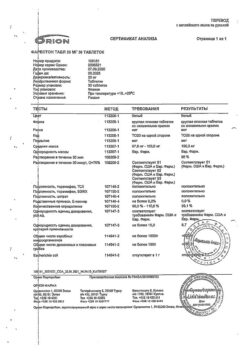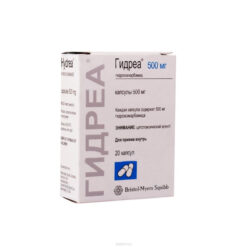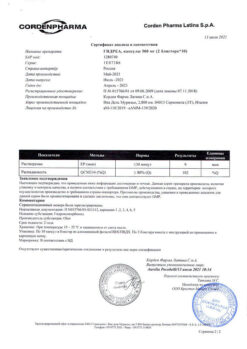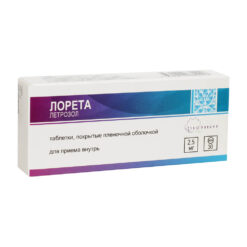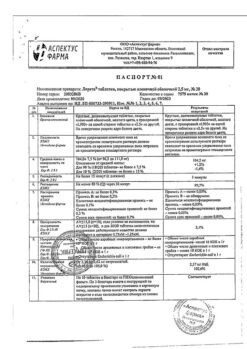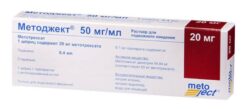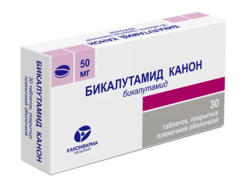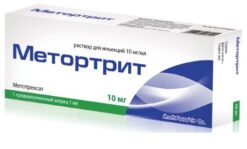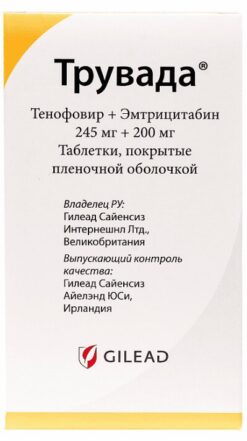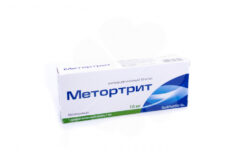No products in the cart.
Description
Letrozole has anti-estrogenic effect, it selectively inhibits aromatase (enzyme of estrogen synthesis) by a highly specific competitive binding to the subunit of this enzyme – cytochrome P450 heme. It blocks estrogen synthesis both in peripheral and tumor tissues.
Indications
Indications
– early stages of breast cancer, the cells of which have hormone receptors, in postmenopausal women, as adjuvant therapy;
– early stages of breast cancer in postmenopausal women after completion of standard adjuvant therapy with tamoxifen as prolonged adjuvant therapy;
– common hormone-dependent forms of breast cancer in postmenopausal women (first-line therapy);
– common forms of breast cancer in postmenopausal women (natural or artificially induced) who have received previous antiestrogens therapy.
Pharmacological effect
Pharmacological effect
Letrozole has an antiestrogenic effect, selectively inhibits aromatase (an enzyme for the synthesis of estrogen) through highly specific competitive binding to the subunit of this enzyme – the heme of cytochrome P450. Blocks estrogen synthesis in both peripheral and tumor tissues.
Special instructions
Special instructions
In patients whose postmenopausal status is unclear, before starting treatment, it is recommended to determine the concentration of luteinizing hormone, follicle-stimulating hormone and/or estradiol to confirm menopausal status.
Renal dysfunction
There is no sufficient data on the use of letrozole in patients with CC less than 10 ml/min. In patients with CC less than 10 ml/min, the ratio of potential risk and expected benefit should be assessed.
Liver dysfunction
Lestrodex should be used with caution, only after a careful assessment of the potential benefit and possible risk in patients with severe hepatic impairment (Child-Pugh class C).
Effect on bone tissue
Letrozole has a strong effect on reducing estrogen concentrations. In patients with a history of osteoporosis and/or fractures or at increased risk of developing osteoporosis, bone mineral density should be assessed by lensitometry at the start of treatment and regularly throughout it. If necessary, treatment or prevention of osteoporosis should be prescribed and the patient’s condition should be carefully monitored.
Other precautions
Since each film-coated tablet of Lestrodex contains 58.4 mg of lactose in the form of lactose monohydrate, it is not recommended for use in patients with rare hereditary diseases of galactose intolerance, severe lactase deficiency or glucose-galactose malabsorption.
Impact on the ability to drive vehicles and operate machinery
Since fatigue and dizziness, as well as drowsiness, may develop during therapy with Lestrodex, caution should be exercised in performing work that requires increased attention, speed of motor and mental reactions (including driving a car or operating machinery).
Active ingredient
Active ingredient
Letrozole
Composition
Composition
1 tab. letrozole 2.5 mg
Excipients:
Contraindications
Contraindications
— endocrine status characteristic of the reproductive period;
– pregnancy;
– lactation period;
– children under 18 years of age (efficacy and safety for children have not been established);
– hypersensitivity to the active substance or to any excipient of the drug.
With caution: severe hepatic (class C on the Child-Pugh scale) and renal failure (creatinine clearance (CC) less than 10 ml/min), lactase deficiency, lactose intolerance, glucose-galactose malabsorption.
Side Effects
Side Effects
As a rule, adverse reactions were mild or moderate and were mainly associated with suppression of estrogen synthesis (for example, flushing, alopecia and vaginal bleeding).
The incidence of adverse reactions is distributed as follows:
Very common (> 1/10), common (> 1/100, 1/1000, 1/10,000 < 1/1000), very rare (< 1/10,000), frequency unknown.
Infectious and parasitic diseases: sometimes – urinary tract infections.
Benign, malignant and unspecified neoplasms (including cysts and polyps): sometimes – pain in tumor foci (not applicable for adjuvant and long-term adjuvant treatment).
From the hematopoietic system: sometimes – leukopenia.
Metabolism and nutrition: often – anorexia. increased appetite, hypercholesterolemia; sometimes – generalized edema.
From the mental side: often – depression; sometimes – anxiety, including nervousness and irritability.
From the side of the central nervous system: often – headache, dizziness; sometimes – drowsiness, insomnia, memory impairment; sensitivity disorder (dysesthesia), including paresthesia; hypoesthesia, impaired taste, episodes of cerebrovascular accident.
On the part of the organ of vision: sometimes – cataracts, eye irritation, blurred vision.
From the cardiovascular system: sometimes – palpitations, tachycardia, thrombophlebitis, including thrombophlebitis of superficial and deep veins, arterial hypertension, coronary heart disease; rarely – pulmonary embolism, arterial thrombosis, stroke.
From the respiratory system: sometimes – shortness of breath, cough.
From the digestive system: often – nausea, vomiting, dyspepsia, constipation, diarrhea; sometimes – abdominal pain, stomatitis, dry mouth.
From the liver and biliary tract: sometimes – increased activity of liver enzymes.
From the skin: very often – increased sweating; often – apothecia; rash, including erythematous. maculopapular. vesicular rash; psoriasis-like rashes; sometimes – itching, dry skin, urticaria; frequency not known – angioedema, anaphylactic reactions.
From the musculoskeletal system: very often – arthralgia; often – myalgia, bone pain, osteoporosis, bone fractures; sometimes – arthritis.
From the urinary system: sometimes – frequent urination.
From the genital organs: sometimes – vaginal bleeding, vaginal discharge, vaginal dryness, pain in the mammary glands.
General disorders and disorders at the injection site: very often – flushing, fatigue, including asthenia; often – malaise, peripheral edema; sometimes – hyperthermia, dry mucous membrane, thirst.
Impact on the results of laboratory and instrumental studies: often – increase in body weight; sometimes – weight loss.
Interaction
Interaction
When letrozole is coadministered with cimetidine and warfarin, no clinically significant interactions are observed.
There is currently no clinical experience with the use of letrozole in combination with other antitumor agents.
According to the results of in vitro studies, letrozole suppresses the activity of cytochrome P450 isoenzymes CYP2A6 and, to a moderate extent, CYP2C19.
Caution should be exercised when using letrozole together with drugs that are metabolized primarily with the participation of the above-mentioned isoenzymes and have a narrow therapeutic index.
Overdose
Overdose
There are isolated reports of cases of letrozole overdose.
Treatment: No specific treatment for overdose is known.
Symptomatic and supportive therapy is indicated. Letrozole is eliminated from plasma during hemodialysis.
Storage conditions
Storage conditions
Store the drug at a temperature not exceeding 25°C.
Shelf life
Shelf life
36 months.
Do not use after the expiration date stated on the package.
Manufacturer
Manufacturer
S.K. Sindan-Pharma S.R.L., Romania
Additional information
| Shelf life | 36 months. Do not use after the expiration date printed on the package. |
|---|---|
| Conditions of storage | The drug should be stored at a temperature not exceeding 25 ° C. |
| Manufacturer | S.C. Sindan-Pharma S.R.L., Romania |
| Medication form | pills |
| Brand | S.C. Sindan-Pharma S.R.L. |
Related products
Buy Lestrodex, 2,5mg 30 pcs. with delivery to USA, UK, Europe and over 120 other countries.

